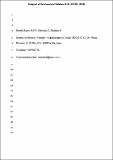Por favor, use este identificador para citar o enlazar a este item:
http://hdl.handle.net/10261/133349COMPARTIR / EXPORTAR:
 SHARE SHARE
 CORE
BASE CORE
BASE
|
|
| Visualizar otros formatos: MARC | Dublin Core | RDF | ORE | MODS | METS | DIDL | DATACITE | |

| Título: | Effect of heavy metals and organic matter on root exudates (low molecular weight organic acids) of herbaceous species: An assessment in sand and soil conditions under different levels of contamination |
Autor: | Montiel-Rozas, María del Mar CSIC; Madejón, Engracia CSIC ORCID ; Madejón, Paula CSIC ORCID | Palabras clave: | Amendments Citric acid Malic acid Oxalic acid Phytoremediation Rhizosphere |
Fecha de publicación: | 1-sep-2016 | Editor: | Elsevier | Citación: | Environmental Pollution (216): 273-281 (2016) | Resumen: | Bioavailability of heavy metals can be modified by different root exudates. Among them, low molecular weight organic acids (LMWOAs) play an important role in this process. Three plant species (Poa annua, Medicago polymorpha and Malva sylvestris), potentially used for phytoremediation, have been assessed for both metal uptake and LMWOAs excretion in contaminated environments with different concentrations of Cd, Cu and Zn. The experiments have been carried out in washed sand and in three contaminated soils where two organic amendments were added (biosolid compost and alperujo compost). The most abundant LMWOAs excreted by all studied plants were oxalic and malic acids, although citric and fumaric acids were also detected. The general tendency was that plants responded to an increase of heavy metal stress releasing higher amounts of LMWOAs. This is an efficient exclusion mechanism reducing the metal uptake and allowing the plant growth at high levels of contamination. In the experiment using wash sand as substrate, the organic acids composition and quantity depended mainly on plant species and metal contamination. M. polymorpha was the species that released the highest concentrations of LMWOAs, both in sand and in soils with no amendment addition, whereas a decrease of these acids was observed with the addition of amendments. Our results established a clear effect of organic matter on the composition and total amount of LMWOAs released. The increase of organic matter and nutrients, through amendments, improved the soil quality reducing phytotoxicity. As a result, organic acids exudates decreased and were solely composed of oxalic acid (except for M. polymorpha). The release of LMWOAs has proved to be an important mechanism against heavy metal stress, unique to each species and modifiable by means of organic amendment addition. | Descripción: | 9 páginas.-- 7 figuras.-- 1 tablas.-- 37 referencias.-- Supplementary data related to this article can be found at http://dx.doi.org/10.1016/j.envpol.2016.05.080. | Versión del editor: | dx.doi.org/10.1016/j.envpol.2016.05.080 | URI: | http://hdl.handle.net/10261/133349 | DOI: | 10.1016/j.envpol.2016.05.080 | ISSN: | 0269-7491 |
| Aparece en las colecciones: | (IRNAS) Artículos |
Ficheros en este ítem:
| Fichero | Descripción | Tamaño | Formato | |
|---|---|---|---|---|
| Effect_heavy_metals.pdf | 603,57 kB | Adobe PDF |  Visualizar/Abrir |
CORE Recommender
SCOPUSTM
Citations
175
checked on 27-mar-2024
WEB OF SCIENCETM
Citations
144
checked on 26-feb-2024
Page view(s)
272
checked on 18-abr-2024
Download(s)
1.384
checked on 18-abr-2024
Google ScholarTM
Check
Altmetric
Altmetric
Este item está licenciado bajo una Licencia Creative Commons

